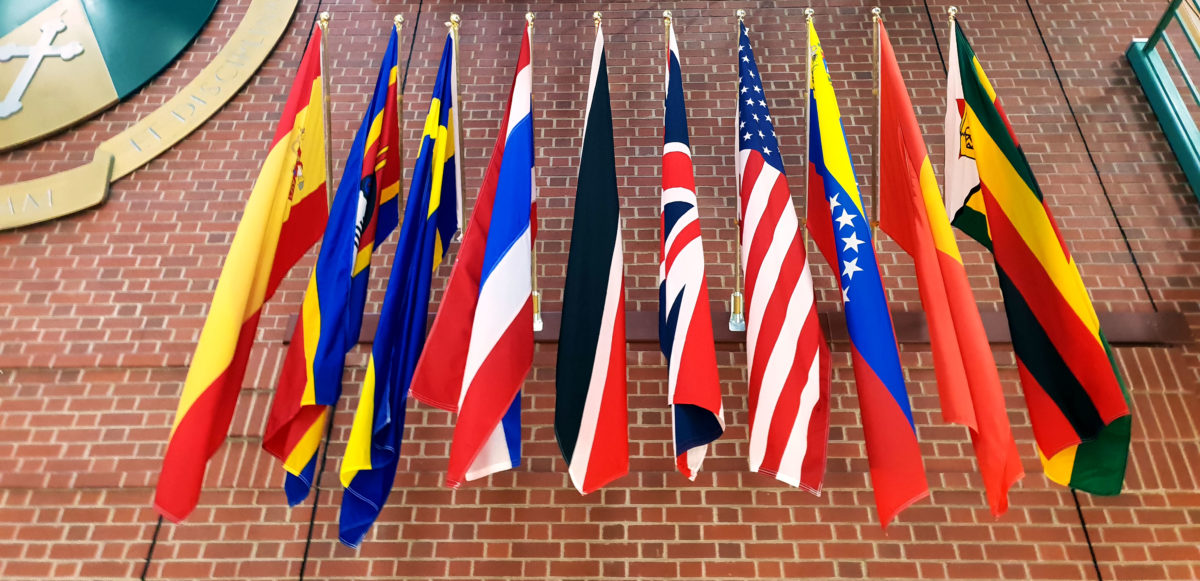Following the 2016 American presidential election, New Hampshire native Ashley Riley felt like she became a go-to person on campus to discuss American politics.
“It was a very rare opportunity being in Canada at that time because all of a sudden I became this ambassador for Americans, specifically young middle class Americans,” said Riley.
The world was shocked on Nov. 8, 2016 when celebrity businessman Donald Trump was elected president. Two years later, students are still writing papers and discussing the Trump administration. The United States held their midterm elections on Nov. 6, 2018, striking up conversation once again. For American students, the discussions hit close to home.
Riley, a history major honouring in Great Books, is from Northfield, New Hampshire, a town of about 4,000 people.
“I was a huge fan of Obama. I thought the U.S. was doing a great job at becoming part of the global unity,” said Riley.
“With Trump coming in, it obviously felt like we took a bunch of steps backwards and it was very confusing.”
Riley voted in the first primary election in 2016, but she was unable to vote in the second because she didn’t complete her absentee ballot on time and her town office was closed when she went home.
Although disappointed with the results, Riley understands why Americans made the choice they did.
“I don’t agree with it, but I understand why Americans feel like they needed to take a really radically different approach. They needed a change that hasn’t happened yet, and [they did it] by voting in a non-politician,” said Riley.
Riley is surprised at how well the U.S. is doing despite how she feels about the Trump administration.
“I’m not saying that he’s doing well, but our economy is doing great which I’m very surprised by,” said Riley. “It’s not raining nuclear bombs yet.”
Riley believes the country is at a turning point and that the American population must decide where they’re headed from here.
“The U.S. is at this crossroad of, ‘Do we go more socialist?’, or ‘Do we resort back to the traditional?’ The most successful time in U.S. history was right after [the Second World War] and pretty much all of Europe was destroyed and the U.S. thrived off the war industry.”
Riley worries about the future of the country, knowing the wrong decision could be detrimental.
“There’s a danger of becoming so isolationist again. I worry about our relationships with Canada and Europe and our global relationships. I think that’s where Trump is really going to falter the most,” said Riley.
Jamie Gillies, an associate professor of communications and public policy at STU, said he was surprised by the results of the 2016 election.
“Every model and every poll for the most part showed Hillary Clinton winning the presidency, but there was always a slim chance that Trump could win and his campaign followed the electoral college math and found a path to victory through swing states in the Midwest,” Gillies said in an email.
Gillies explained the midterm elections as “a referendum on the incumbent presidential administration and the party in power in Washington.”
He said it’s common for a party to lose seats in the midterms, but he was surprised at how many seats the Republicans lost in the 2018 election.
“But in the Republican Party’s case in 2018, the economy was doing quite well, so losing the House can be seen partially as a repudiation of Trump himself, especially as we continue to analyze voting patterns that show that a sizeable group of the public, particularly suburban female voters, switched to the Democrats in these midterms.”
Riley, who voted in the midterms, said the results of the election made her optimistic about where America is headed.
“I am pleasantly surprised by this most recent election because of how historically groundbreaking it was,” Riley said, referencing the election of women and Native American representatives.
“I definitely think that there is a great hope for the future.”
Zachary Hansen, a second-year student at STU, said he wasn’t old enough to vote in 2016, but he watched the elections closely.
“If you’d asked me a few weeks prior, I probably would’ve been surprised if you said Trump won. As the night went on, I saw Trump start winning states and I was like, ‘It makes sense, honestly,’” said Hansen.
Hansen, who is studying history and political science, is from Jacksonville, Florida, a city of about 890,000 people.
Hansen said people need to understand Americans wanted change. He said the country is now divided by those who like Trump and those who don’t.
“It’s either you like Trump or you don’t like Trump. There’s no in between anymore. It’s two extremes. I believe I’m somewhere in the middle,” said Hansen.
Hansen said he often disagrees with who the Trump administration hires.
“A lot of the people [Trump] hires for the administration there are problems with, [people] that are just questionable or don’t have the proper credentials,” said Hansen.
Hansen believes the U.S. needs a third party to soften the divides between Democrats and Republicans.
“America is very divided right now,” he said. “The internet has only amplified it.”
Hansen wasn’t able to vote in the midterm elections due to complications with his voter registration. But he still followed along.
“I’m not surprised the Democrats won the House. They were not going to win the Senate, that’s pretty much a fact,” said Hansen.
Despite being away from home during during this historical time in American politics, Riley believes it offers her a unique experience.
“I definitely think it’s an interesting time to be a young American studying in Canada.”

